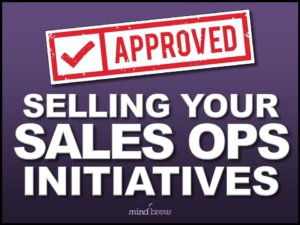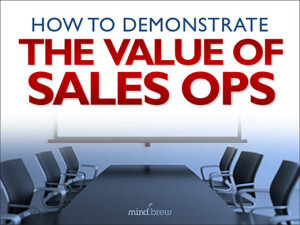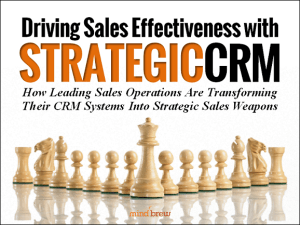At many organizations, the executive team doesn’t have a single member with sales ops experience. As a result, they don’t really know what sales ops is all about.
You might be thinking, “Fine by me. If they don’t notice me, I’ll be able to do my work without interference from anyone.”
Unfortunately, flying under the radar in this way usually is not a very effective strategy. You’re going to need approval from the management team to get budget approved for your initiatives. And if they don’t know you or what you are about, that’s going to be very, very difficult.
A far more effective strategy is to engage with the management team. And in order to do that well, it helps to have a realistic understanding of how they operate. Sure, in a perfect world, all executives would always do what’s best for their companies. But in the real world, a lot of different dynamics come into play.
Here are ten of the most common dynamics we’ve uncovered in our research:
- CEOs tend to lean on consensus decisions. In the past, CEOs tended to push through their own agendas regardless of what the other executives thought. Today, they are far more likely to strive for consensus, which makes it more likely that the team will work together while also making it less likely that the CEO will get blamed for a bad decision.
- Each leadership team member has their own pet projects and priorities. If an exec sees your initiative as competing with their own, they might push back against your project. But if you can find an executive whose interests align with your own, you might gain a powerful ally.
- They’re more risk averse than you might expect. Business leaders are human. And like all humans, they will do a lot to avoid what they perceive as danger.
- Effect on the management team itself often play a role in decisions. Being human also means a strong sense of self-preservation. If your project might have a negative effect on an exec’s short-term stock options, they might be less inclined to support it, even if they don’t consciously realize what they are doing.
- They’re often very skeptical of ROI and payback projections. These people have created ROI and payback projections themselves, so they know how the game is played. Be conservative in your numbers because you will get pushback on anything that looks even slightly dubious.
- More credence is given to savings that upside growth. Psychologists tell us that we tend to see more value in a penny saved than a penny earned, even though the value is the same. Executives are no different than anyone else in this regard.
- A CFO has more “no” weight than “yes” weight. You want to have the CFO on your side because they have a lot of veto power. However, they often do not have a lot of power to champion a new initiative. For that, you’ll need an additional ally.
- Most will work hard to avoid “taking one for the team.” If a project will make life difficult for a particular executive’s team, they are going to argue against it, even if it would be best for the company overall. Be prepared for this reality.
- They are heavily influenced outside of the meeting room. Yes, you want to make a good presentation in the meeting, but your interactions with the executives outside the conference room could be far more influential. And don’t forget that the things they are hearing from other people outside the meeting are going to carry weight as well.
- Evaluation and proposal structures are often a facade. If your organization has a particular form that you have to fill out for proposals, yes, you should fill it out. But don’t expect that this one application actually carries a ton of weight in the decision process. Most executives will be making decisions based on things other than what they read in the paperwork.
If you’d like more advice on working with an executive team, we have a pair of resources for you. Check out Selling Your Sales Ops Initiatives and Demonstrating the Value of Sales. Both can help you become a better advocate for your role in the company.
When people understand the good that sales ops can do, they are more likely to approve sales ops initiatives. And as you get more initiatives approved, you’ll be able to show more people how much good sales ops can do. It starts a virtuous cycle that has exceptional benefits for the sales ops team and the company as a whole.












